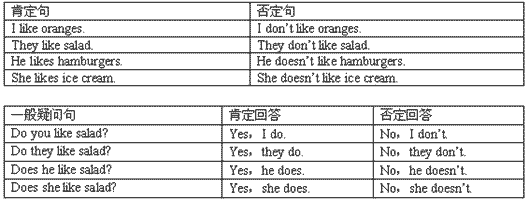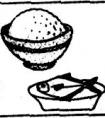对画线部分进行提问。1. Igotoschoolbybike. 2. IcomefromChina. 3. I'mgoingtotakeatripnextweek. 4. Myfatherisapoliceman.5. Heworksinthepolicestation. 6.-六年级英语
D、对“颜色”划线,用What colour。
Her sweater is red. → What colour is her sweater?
E、对“可数名词的数量”划线用How many +复数名词。
She has one red coat. → How many red coats does she have?
I have six books. → How many books do you have?
F、对“不可数名词的数量”划线用How much+不可数名词。
I want to buy three kilos of meat. →How much meat do you want to buy?
G、对“职业”划线用What。
She is a driver. → What is she?
My father is a farmer. → What is your father?
H、对“星期几”划线用What day。
It's Sunday today. → What day is it today?
I、对“时间”划线用What time。
We go to school at seven in the morning. → What time do you go to school in the morning?
It is five o’clock now. → What time is it?
考点名称:一般现在时,动词单数第三人称
一般现在时:
表示现在经常反复发生的动作、存在的状态或习惯性的动作的时态。可概括为
①经常性或习惯性动作;
②长期存在的特征或状态;
③普遍真理、客观事实等。
构成:
一般现在时用行为动词的原形,但第三人称单数作主语时,动词的词尾要加-S。
a. 表示经常性或习惯性的动作。
例:Li Ming always helps the old man. 李明一直帮助这位老人。
We usually go to school on foot. 我们通常步行上学。
They sometimes go fishing on Sundays. 他们有时周日去钓鱼。
b. 表示永恒不变的事实或真理。
例:A bird flies with wings. 鸟用翅膀飞翔。
c. 用在格言、谚语中。
例:Pride goes before a fall. 骄者必败。- 一般现在时具体用法:
1.表示经常的或习惯性的动作,常与表示频率的时间状语连用。
时间状语:
always,usually,every morning/night/evening/day/week/year,often,sometimes,
occasionally,from time to time,twice a week,rarely,seldom,once a month,hardly,ever,never.
e.g: I leave home for school at 7:00 every morning.
2.表示主语具备的性格、能力、特征和状态。
e.g:I don't want so much.
Ann Wang writes good English but does not speak well.
比较:Now I put the sugar in the cup.
I am doing my homework now.
3.表示客观事实和普遍真理。
e.g :The earth moves around the sun.
Shanghai lives in the east of China.
4.在时间状语从句和条件状语从句中,常用一般现在时代替将来时。
5.表示预先计划或安排好的行为。
6.小说故事用一般现在时代替一般过去时。新闻报道类的内容,为了体现其“新鲜”性,也用一般现在时来表示过去发生的事情。
7.有些表示状态和感觉的动词表示现在发生的具体行为时,只用一般现在时,而不用进行时态。
8.表示现在发生的具体动作或存在的状态
9表示格言或警句中。 e.g Pride goes before a fall. 骄者必败。
注意:此用法如果出现在宾语从句中,即使主句是过去时,从句谓语也要用一般现在时。
例:Columbus proved that the earth is round..
第一句用一般现在时,用于操作演示或指导说明的示范性动作,表示言行的瞬间动作。
再如:Now watch me,I switch on the current and stand back.
第二句中的now是进行时的标志,表示正在进行的动作的客观状况,所以后句用一般现在时。 - 一般现在时用法表:

第三人称单数的构成见下表:
不规则变化have和be动词 变have为has 变be为am,is,are例: have-has; be-am,is,are词
构成
举例
一般情况
词尾+s
动词原形
第三人称单数
work(工作)
stop(停止)works
stops以-ch, -sh, s, x, o结尾
词尾+es
teach(教)
wash(洗)
dress(装扮)
fix(安装)
go(去)teaches
washes
dresses
fixes
goes以“辅音字母+y”结尾
变y为i,再加es
fly(飞翔)
try(尝试)flies
tries 一般现在时的特殊用法:
一些动词可用一般现在时来表达现在进行时:
verbs of the senses: hear,see,taste,smell,feel
verbs of the thinking: believe,know,mean,realize,think,remember
verbs of the linking: dislike,fear,heat,like,love,want
verbs of the possession: belong,have,own,possess
考点名称:一般将来时
一般将来时:
表示将来某个时间要发生的动作或存在的状态,也表示将来经常或反复发生的动作。
由“助动词will+动词原形”构成。“be going to+动词原形”结构是将来时的另一种形式,表示将要发生的事或者事先经过考虑打算去做某事。
例:We will go to Shanghai next year. 明年我们要去上海。
We are going to have a football match tomorrow. 我们明天要举行一场足球比赛。
Tom is going to have a bath. 汤姆要去洗澡了。一般将来时常见结构:
1、will / shall + 动词原形(否定句在will/shall后加not)
will 常简略为 'll,并与主语连写在一起,如: I'll,she'll,he'll,it'll,we'll,you'll,they'll。
一般疑问句如用will you…?其简略答语须是Yes,I will或 No,I won't;如用 Shall I…?(较少见)其简略答语须是 Yes,I shall.或 No, I shall not.
这种方法一般单纯地表示将来某个时间将要发生的动作或存在的状态。will用于各种人称;shall只用于第一人称。 例如 :
I will / shall go to visit him next week. 下周我将去拜访他。
What time shall we go there tomorrow? 明天我们几点去那儿?
2、be going to 动词原形
be going to 相当于一个助动词(其中be有人称和数的变化),与它后面的动词原形一起构成谓语。用来表示近期将要发生的动作以及计划、安排和打算要做的事。例如:
There is going to be a football match this afternoon.今天下午将有一场足球赛。
I‘m going to go to the park. 我将要去公园。
常用结构:
1、用于"I expect, I'm sure, I think, I wonder宾语从句"中。
Don't worry about the exam. I'm sure you'll pass.
不要担心这次考试,我确信你会通过的。
2、用于祈使句和陈述句中。
Work hard and you will succeed.
如果你努力,就会成功的。
3、与表示时间或条件的状语从句连用。
I'll let you know as soon as he arrives.
他一到我就通知你。- be going to与will的区别:
be going to与will两者都可表示将要发生的事、将要去做某事,但它们有如下几点区别:
1. be going to 表示近期、将要发生的事情,will 表示的将来的时间则较远一些,如:
He is going to write a letter tonight.
He will write a book one day.
2. be going to 表示根据主观判断将来肯定发生的事情,will表示客观上将来势必发生的事情。
He is seriously ill. He is going to die.
He will be twenty years old.
3. be going to 含有“计划,准备”的意思,而 will 则没有这个意思,如:
She is going to lend us her book.
He will be here in half an hour.
4.在有条件从句的主句中,一般不用 be going to, 而多用will, 如:
If any beasts comes at you, I'll stay with you and help you
注意
be going to和will在含义和用法上稍有不同。be going to往往表示事先经过考虑的打算;will多表示意愿,决心。两者有时不能互换。如:
- 最新内容
- 相关内容
- 网友推荐
- 图文推荐
| [家长教育] 孩子为什么会和父母感情疏离? (2019-07-14) |
| [教师分享] 给远方姐姐的一封信 (2018-11-07) |
| [教师分享] 伸缩门 (2018-11-07) |
| [教师分享] 回家乡 (2018-11-07) |
| [教师分享] 是风味也是人间 (2018-11-07) |
| [教师分享] 一句格言的启示 (2018-11-07) |
| [教师分享] 无规矩不成方圆 (2018-11-07) |
| [教师分享] 第十届全国教育名家论坛有感(二) (2018-11-07) |
| [教师分享] 贪玩的小狗 (2018-11-07) |
| [教师分享] 未命名文章 (2018-11-07) |

![—? —There'sabedandtwoendtables.[ ]A.WhatcanyoudoB.What'sintheroomC.Whereistheroom-五年级英语](http://www.00-edu.com/d/file/ks/4/1/66/2019-09-01/small99905fb6cf464b2289a7b5ecf53245d41567347804.gif)
![[ ]A.What'sthetime,please?B.Howareyou?C.What'stheweatherliketoday?-六年级英语](http://www.00-edu.com/d/file/ks/4/1/66/2019-09-01/small942a3cf2b2278a48405f5dd91a959cc01567346776.jpg)


![[ ]A.He'sathome.B.Hisnameispeter.C.It'snotmine.-六年级英语](http://www.00-edu.com/d/file/ks/4/1/66/2019-09-01/small91adfc04a7bf83aa6595e05e37cf44bf1567346766.jpg)
